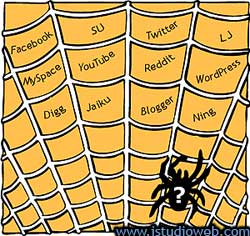 Small businesses are usually cash-strapped. Even if not, they hardly have piles of cash laying around their offices. In recent days I had a few people asking me for some kind of small business friendly technical resources citing lack of funds to pay for full-scale items – be it web design, search engine promotion or just a laptop and a printer.
Small businesses are usually cash-strapped. Even if not, they hardly have piles of cash laying around their offices. In recent days I had a few people asking me for some kind of small business friendly technical resources citing lack of funds to pay for full-scale items – be it web design, search engine promotion or just a laptop and a printer.
So after talking to quite a few people I have put together a quick SMALL BUSINESS DON’T checklist. Basically, if you are doing more then one thing from the list below – you already shooting yourself in both feet.
- DON’T take any free web site offers. The reason is simple – whatever is free is worth what you pay for it. As you already know, if your business is not online – it doesn’t exist. But if your web site is covered with banners and ads you have no control over, is slow to load even on fast connection, times out frequently and looks like it was put together last night after couple of six-packs – I’d be surprised if it will land you any significant income. However, by spending a reasonable amount for professionally-looking web site you will be able to get better deals and maintain the professional image from the beginning.
- DON’T buy extremely cheap computer or hardware with good intention to replace it “later”. If you will find it troublesome to do any significant work on that cheap piece of equipment, you most likely will loose any motivation to do the work. There is a telltale that famous Paganini performing on three, two and even one string of his violin while they break. One thing you have to remember is that he already was Paganini when that happened; it didn’t happen while he was starting his career. Small screen and below-average performance may impede you from doing more in less time, and the time is the only asset you have when starting a company.
- DON’T buy the top of the line stuff either, unless absolutely neccessary. As a small business operator myself, I am always in doubt when I hear some fellow small business owner’s justification of purchasing a top fo the line notebook. Most likely you competing with someone who already have more money than you do. Therefore, if buying a $5,000 computer is what going to make you a winner then you already lost – the other guy can always buy more, faster and at a larger discount.
- DON’T go for cheapest credit card processor if your business requires it. Go for the one you have the most trust in. In addition to PayPal both Google and Amazon offer payment solutions, so there is really no need to go in all the gray areas. Besides, shady processor may damage your business’ credit rating which might take years to rebuild.
- DON’T underestimate
the power of the Forcethe power of the crowd. Visit all the consumer-feedback web sites and visit them often. Not only you can get a better understanding of how your business is viewed from the consumer prospective, you can also get an idea how visible it is to the outside world at all. If you are a niche player – visit niche forums and groups, if you sell or provide services to wider audience – visit general feedback web sites. - DON’T be afraid to put a face to your business. If you’re inclined to participate in online discussions about your company or your product – make it known who you are. It gives your current and potential customers some sort of a feedback shortcut. In a long run it may do more good to your company’s image.
Obviously the list is as short as it is incomplete. Feel free to add more.
 While everybody is watching Olympics in China, there are couple of wars going on. There’s a war in
While everybody is watching Olympics in China, there are couple of wars going on. There’s a war in